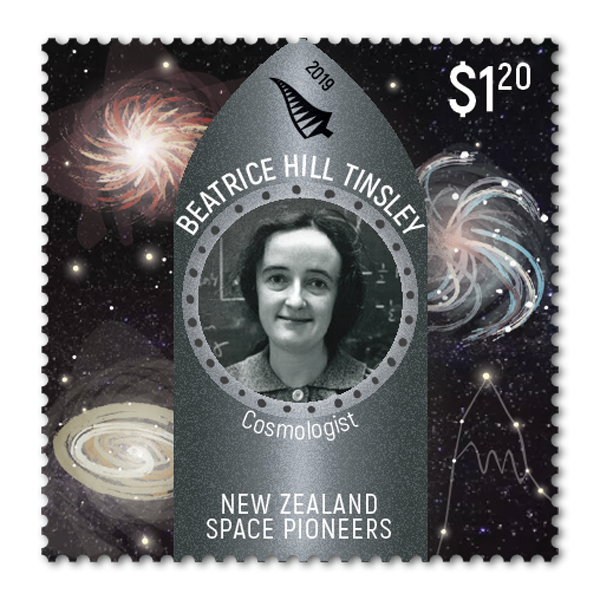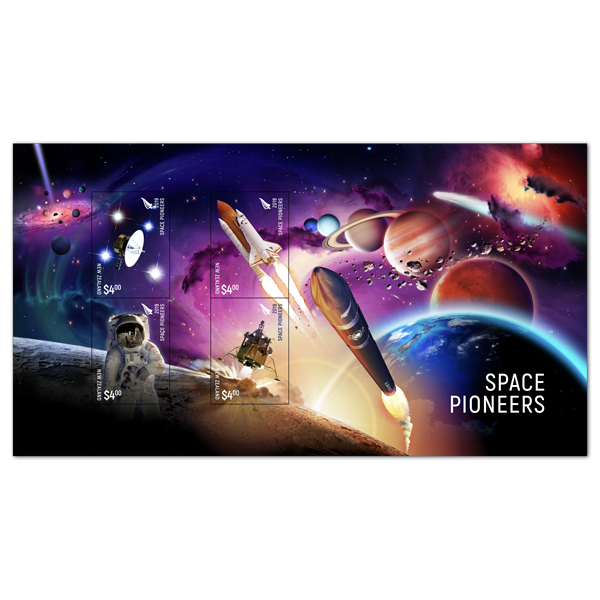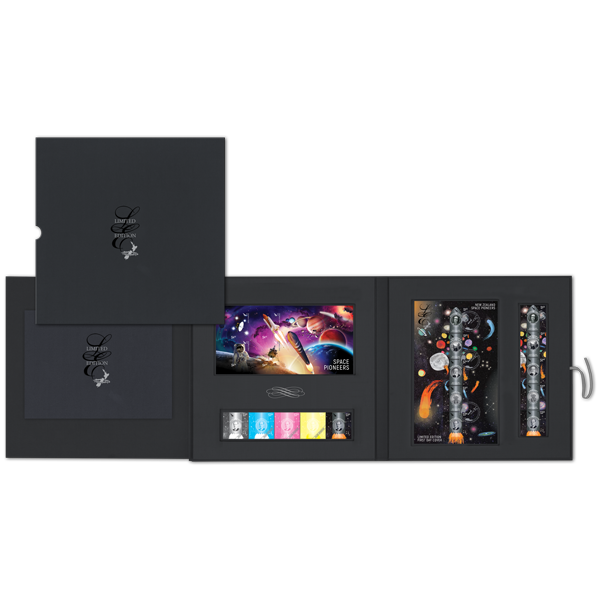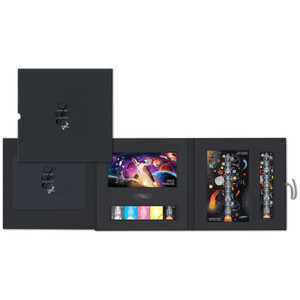Immersed in a clear, unpolluted southern sky, from New Zealand we have more stars and galaxies accessible to the naked eye than in most parts of the Northern Hemisphere. It is not surprising then that for most of New Zealand’s history, the lines between professional and amateur astronomers have been blurred. It is in this spirit that New Zealanders have helped to advance the world’s knowledge about space and space sciences.
Issue information
These fun stamps celebrate six of New Zealand's astronomers, cosmologists, discoverers and rocket scientists. They have been topped off with a sprinkling of crushed meteorite and together form a rocket ship shape in a se-tenant strip.
First Day Cover
Immersed in an amazing night sky, from New Zealand we can see at a glance the three brightest stars. In fact, more stars and galaxies are accessible to the naked eye from this side of the world than anywhere in the Northern Hemisphere. It’s no wonder that New Zealanders are some of the bright stars who have made major contributions to the world’s knowledge about space and space sciences. The first day cover for this issue displays all five stamps over an imaginarily-illustrated background, with New Zealand visible on Earth.
3D Lenticular Miniature Sheet
This mesmerising 3D lenticular miniature sheet is a celebration of the world’s achievements in space exploration. The four stamps feature spacecraft Voyager 1, which reached interstellar space; the Space Shuttle, America’s reusable spacecraft which launched many satellites including the Space Station; the first Moon walk on 20 July 1969; and the lightweight craft Apollo Lunar Module, used to transport astronauts to the Moon’s surface. The Solar System, a comet, nebula and the galaxy with exoplanets, and New Zealand's history-making Electron rocket by Rocket Lab form the background to the stamp sheet.
Presentation Pack
Learn more about New Zealand’s contribution to the space sciences with commentary from Museums Wellington Senior Science Communicator Haritina Mogoșanu. This pack includes a first day cover, a 3D lenticular miniature sheet and a setenant strip of five stamps.
Limited Edition
Kiwi astronomers Alan Gilmore and Pamela Kilmartin are active comet and nova hunters. Based at the University of Canterbury's Mt John Observatory, they concentrate on following up discoveries made by NASA-funded NEO search programmes run on big telescopes in Arizona and Hawai'i. New Zealand's position a few hours west of these places enables them to follow up discoveries made just hours earlier. Find out more about their discoveries with this limited edition.
Product Listing for New Zealand Space Pioneers
| Image | Title | Description | Price |
|---|---|---|---|
 |
Single Stamp |
Single $1.20 'Beatrice Hill Tinsley' gummed stamp. Pioneer astrophysicist Beatrice Hill Tinsley was a world-leader in modern cosmology. Her 114 published papers are regularly cited today, showing her ongoing contribution to understanding the Universe. Mt Tinsley in Fiordland was named in her honour. |
$1.20 |
 |
Single Stamp |
Single $1.20 'Alan Gilmore and Pamela Kilmartin' gummed stamp. Active comet and nova-hunters, Alan Gilmore and Pamela Kilmartin discovered 41 minor planets. They also established a programme for tracking near-Earth asteroids and southern comets from New Zealand. Alan is also a member of the prestigious International Astronomical Union. |
$1.20 |
 |
Single Stamp |
Single $2.40 'Charles Gifford' gummed stamp. Charles Gifford was New Zealand’s most outstanding astronomer in the first half of the 20th century. Using mathematics, he showed that the Moon’s craters were made by meteorite impact. |
$2.40 |
 |
Single Stamp |
Single $3.00 'Albert Jones, OBE' gummed stamp. Astronomer Albert Jones made 500,000 visual brightness estimates - more than anyone in history. With a telescope he built in 1948, he also discovered two comets and a supernova. |
$3.00 |
 |
Single Stamp |
Single $3.60 'William Pickering, ONZ KBE' gummed stamp. Pioneer of space exploration William Pickering launched America’s first spacecraft. He was instrumental in the success of the Apollo programme and the Voyager missions and retired to see Viking 1 on its way to Mars. Mount Pickering Summit, in Fiordland, was named in his honour. |
$3.60 |
 |
Lenticular Miniature Sheet |
Mint, used or cancelled lenticular miniature sheet. In 2019 the world celebrates 50 years since the first Moon landing. Featured on this 3D lenticular miniature sheet are some significant moments in space exploration, including this historic event. Although New Zealand is a small nation, Kiwis have made - and continue to make - major contributions to space discoveries in the areas of astronomy and cosmology. And in 2018, we became the 11th country to put an object into orbit, with Rocket Lab’s Electron launch vehicle. |
$16.00 |
 |
First Day Cover | First day cover with five gummed stamps affixed. Cancelled on the first day of issue. | $11.90 |
 |
Presentation Pack |
Haritina Mogoșanu is the Executive Director of the New Zealand Astrobiology Network (NZAN). Her area of expertise is planetary protection, international security and science communication. She is also the Senior Science Communicator for Museums Wellington, Space Place at Carter Observatory. In this presentation pack, Haritina explained why New Zealand is special when it comes to exploring the space sciences. |
$29.90 |
 |
Limited Edition |
This limited edition was the ultimate collector’s item for this issue. It included a limited-edition first day cover, a 3D lenticular miniature sheet and a set of colour-separated stamps. In the booklet you found out about the fascinating careers of active Kiwi astronomers Alan Gilmore and Pamela Kilmartin. |
$135.00 |
Technical information
New Zealand Space Pioneers
| Date of issue: | 1 May 2019 |
|---|---|
| Number of stamps: | Five gummed stamps |
| Denominations: | $1.20 x 2, $2.40, $3.00, $3.60 |
| Stamps, miniature sheet and first day covers designed by: | Hannah Fortune, New Zealand Post, Wellington, New Zealand |
| Printer and process: | Southern Colour Print, Dunedin, by lithography |
| Number of colours: | Four process colours plus ground meteor dust applied to overgloss |
| Stamp size and format: | 36.95mm x 37.5mm (vertical) |
| Paper type: | Tullis Russell 104gsm red phosphor gummed stamp paper |
| Number of stamps per sheet: | 25 |
| Perforation gauge: | 14. x 14.62 |
| Special blocks: | Plate/Imprint blocks could be obtained by purchasing at least six stamps from a sheet. Barcode blocks were available in A and B formats. |
| Period of sale: | These stamps remained on sale until 30 April 2020. First day covers remained on sale until 26 June 2019. |
3D Lenticular Miniature Sheet
| Date of issue: | 1 May 2019 |
|---|---|
| Number of stamps: | Four gummed stamps |
| Denominations: | $4.00 x 4 |
| 3D lenticular miniature sheet designed by: | Sam Taylor, Napier, New Zealand |
| Printer and process: | Cartor Security Printers, lenticular 3D |
| Number of colours: | Four process colours |
| Stamp size and format: | 29.8 x 40.6mm (vertical) |
| Miniature sheet size and format: | 200mm x 100mm (horizontal) |
| Paper type: | Lenticular with 3D effect 846gsm |
| Number of stamps per sheet: | Four |
| Perforation gauge: | Die cut |
| Period of sale: | This miniature sheet remained on sale until 30 April 2020. |



